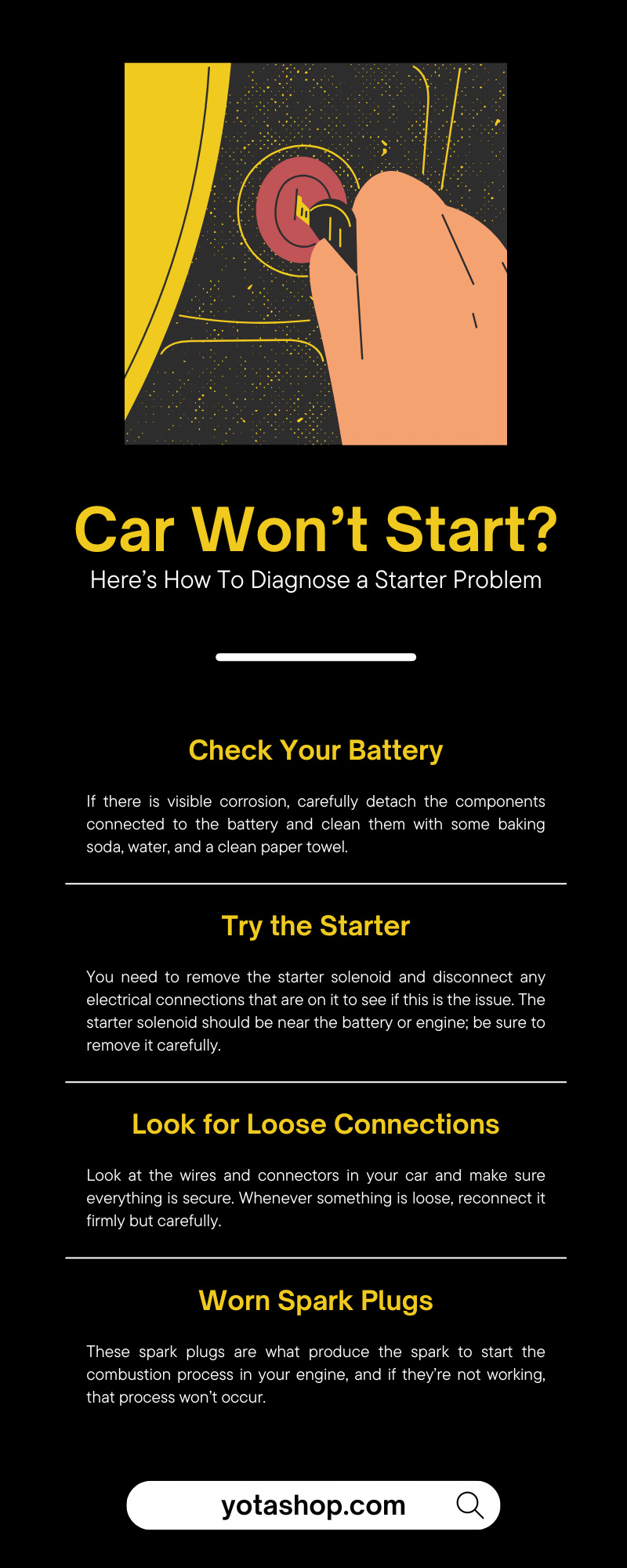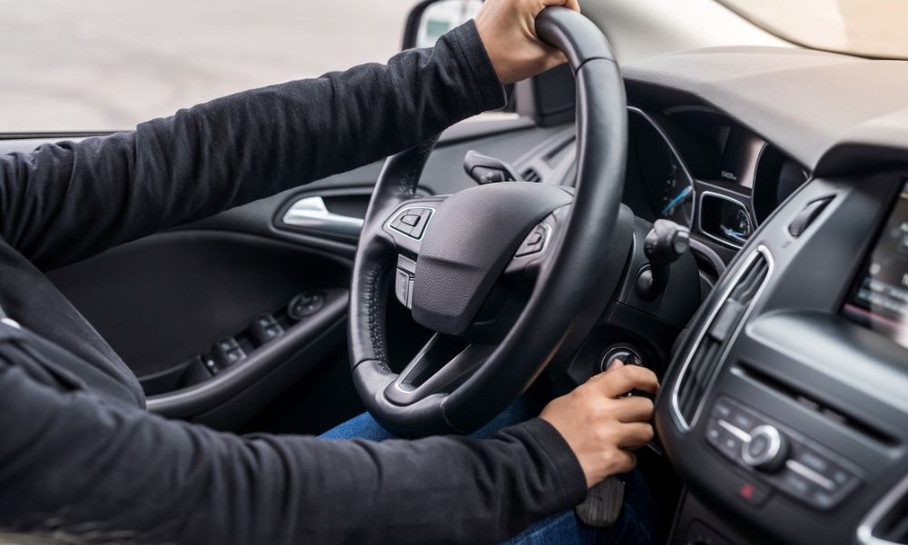There are a lot of different components in your vehicle, and when some wear down, your car may not drive as efficiently as it once did. It’s important to fix these parts sooner rather than later, but there are other components that, when they age, can stop your car from starting altogether. These starter problems are hard to diagnose outside of your car not starting, but there are ways to spot and address them.
Check Your Battery
One of the first things you should look into when your car doesn’t start is your battery. There may not actually be an issue with the starting components of your vehicle, but instead, your battery could just be dead or have a tricky connection.
The first things you should look into are the battery terminals. It’s easy for these components to come lose or even start corroding. If there is visible corrosion, carefully detach the components connected to the battery and clean them with some baking soda, water, and a clean paper towel. You can then test the voltage of your battery with a multimeter or voltmeter, and if the reading is incredibly low, the battery could be the culprit. If it’s in the normal operating range, your car isn’t starting for another reason.
Try the Starter
If the issue isn’t your battery, you may have something wrong with your starter. You need to remove the starter solenoid and disconnect any electrical connections that are on it to see if this is the issue. The starter solenoid should be near the battery or engine; be sure to remove it carefully.
With the starter removed, you’ll need to give it a thorough examination. If you spot any corrosion or worn-out parts, there may be an issue. Additionally, you can turn the input shaft on the starter with a wrench—if there’s resistance or a strange noise, there’s an additional issue with the starter itself. If either issue is present, it’s time for you to invest in an entirely new starter. The replacement process can be tricky, so be sure to work with a professional or consult the vehicle’s manual.
Starter Relay
Another starter component that the issues could originate from is the starter relay. This component is a small electrical device in the circuit of the current motor, and it can be hard to spot unless you’re looking at a diagram of the circuit. After you find the starter relay, you can use an ohmmeter to determine if there is electrical continuity between the different relay pins. When there’s no continuity, the electrical current can’t make its way through the entire system and start your car. If that’s the case, you will need to get a starter relay replacement.
Look for Loose Connections
If you’re not finding any electrical issues or problems with the car’s battery, it may be time to start looking for any loose connections. A loose connection can seem minimal, but it can have a significant impact on your car’s ability to start consistently. Look at the wires and connectors in your car and make sure everything is secure. Whenever something is loose, reconnect it firmly but carefully. Small details such as this can make a big difference in your car’s ability to start, but if it’s still having trouble, there may be another issue at hand.
Worn Spark Plugs
Another component you should look into if you’re having trouble starting your car is your spark plugs. A dead battery or lack of gas could stop the ignition process, but another common culprit is worn, missing, or broken spark plugs. These spark plugs are what produce the spark to start the combustion process in your engine, and if they’re not working, that process won’t occur.
It’s important to note that you may see issues with your spark plugs before your car stops completely. As these components wear down, you’ll notice other forms of start-up trouble as well as:
- Rough idling
- Lower fuel economy
- Engine misfiring
- Engine knocking
- Rough idling
- Poor acceleration
If you notice these symptoms before the car stops starting completely, it may be time to get yourself some new spark plugs. A good rule of thumb is to replace your spark plugs every 30,000–50,000 miles. Even if there’s no issue yet, it may be worthwhile to replace the spark plugs so that you can avoid these issues entirely.
Examine Your Alternator
The alternator is part of your car that produces the majority of your vehicle’s electricity, keeping everything moving. However, if there’s something wrong with your alternator, things may be at a standstill when you’re trying to start the vehicle. If nothing is starting, it’s time to pay your alternator a visit.
This part of your vehicle’s electrical system requires a multimeter to see if the voltage output is functioning. Anything below 12 volts is a sign that it’s not functioning as it should. In that case, you should replace it to stop any additional issues from happening. Your car may not start, but a faulty alternator can also create other issues if you don’t repair it quickly enough, such as a stalled engine, a dead battery, or a misaligned drive belt.
Get a Professional Opinion
If you’ve tried just about everything and are still struggling to start your car, it may be time to throw in the towel and get some professional help. Mechanics deal with cars all day and can easily identify whatever the issue is that’s plaguing your car. Additionally, depending on the make and model of your vehicle, they may even be able to use an electronic diagnostic tool to determine the issue.
Depending on the resources and time available to you, you could even consider choosing this option first. If time is not something you have much of, make things simple by getting a qualified mechanic to check your vehicle and repair it if they have the right tools. With their expertise, they can identify and fix any issues you have with your car’s starter in no time at all.
Diagnosing a starter problem is an important part of fixing a car that won’t start, but repairing the issue is another matter entirely. With this list, you can spot when something’s wrong, and with the right DENSO Toyota parts from Yota Shop, you can fix it. We’ve been in this industry for a long time, so work with us to give your vehicle the care it requires.


